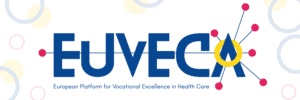On 13 December, the BeWell project hosted the launch event of the European health multistakeholder partnership on skills gaps and emerging occupations set up under the Pact for Skills initiative. This online launch event focused on the importance of building a European-wide multistakeholder partnership to collaboratively work on shaping a European health workforce able to engage with the digital and green transformation of the sector. EUVECA was represented on the panel by Anja Lund, President of the Digitalisation Committee of the Region of South Denmark.
The event was opened by Sandra Gallina, Director-General for Health and Food Safety, who presented the European Commission Pact for Skills initiative. Following Gallina’s keynote speech, the large-scale partnership manifesto outlining the ambition and objectives of the partnership was presented. Thereafter, the moderated panel discussion took place, bringing together Jan Willem Goudriaan, General Secretary of EPSU, Ronald Batenburg, Research programme Coordinator of NIVEL, Anja Lund, President of the Digitalisation Committee of the Region of South Denmark, and Elizabeth Adams, President of the European Federation of Nurses Associations.
EUVECA at the launch event
The partnership’s ambitions are closely aligned with the EUVECA project’s objectives and our strategy on creating synergies with other projects. EUVECA has actively supported the launch of the European health multistakeholder partnership by nominating a speaker to the panel discussion, Anja Lund.
In her speech, Anja emphasised that over the years, the Region of South Denmark has established a strong local culture of collaboration with partners, citizens and patients focusing on the sustainability of the health sector and ensuring satisfactory working conditions for health professionals. She reiterated that similarly to the manifesto’s ambitions, she also believes that it is vital to create a lifelong learning culture where health professionals have access to high quality training, the demand and supply of health care education and vocational training are well coordinated in a close dialogue between the health care providers and the health care education providers.
As Anja Lund noted, being part of this new large-scale partnership will help EUVECA to scale up at European level the innovation in VET education we are advocating for. Moreover, it will provide our Regional Vocational Excellence Hubs a much higher visibility. Leveraging this visibility, EUVECA will be able to reach out to a wider group of European health students and professionals to offer them the opportunity to learn and obtain new essential 21st century skills and motivate them to participate in our blended mobility activities. In return, the blueprint, the European strategy that the BeWell project will develop for upskilling and reskilling the health workforce will set a framework for our regional activities which our Hubs can refer to to raise vocational education and training high on the regional political agenda.
Next steps
As the following steps, the BeWell project partners will develop a work plan and start offering services to facilitate networking and knowledge exchange between the partners of the Partnership and provide funding advice later in 2023. On the EUVECA project part, we will stay involved and collaborate within the Partnership.



